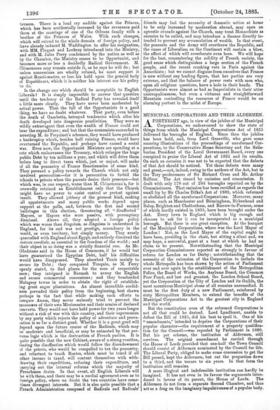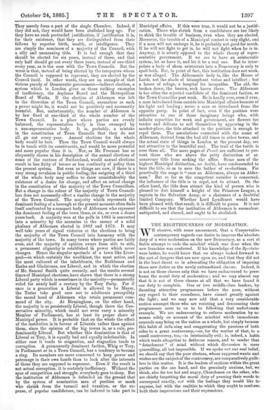MUNICIPAL CORPORATIONS AND THEIR ALDERMEN.
AFORTNIGHT ago, in view of the jubilee of the Municipal Corporations, we endeavoured to show the state of things from which the Municipal Corporations Act of 1835 delivered the boroughs of England. Since then the jubilee has been held, and, from Lord Granville, who gave some amusing illustrations of the proceedings of unreformed Cor- porations, to the Conservative Home Secretary and the Salis- burian President of the Local Government Board, every one conspired to praise the Liberal Act of 1835 and its results. On such an occasion it was not to be expected that the defects of that Act should be noticed. Yet those defects were many and great,—not, indeed, owing to the authors of the Act, but to the Tory predecessors of Sir Richard Cross and Mr. Arthur Balfour. The Act sinned by omission and commission. It dealt with only 178 out of 284 boroughs reported on by the Commissioners. That omission has been rectified as regards the small fry by Sir Charles Mike's Act of 1883, which reformed or abolished all the unreformed Corporations. Moreover, many places, such as Manchester and Birmingham, Birkenhead and Salop, Brighton and Cheltenham, and Barrow-in-Furness, some of which hardly existed in 1835, have been brought under the Act. Every town in England which is big enough and chooses to ask for it can be incorporated as a municipal borough. But there is one great exception. At the banquet of the Municipal Corporations, where was the Lord Mayor of London ? Not, as the Lord Mayor of the capital ought to have been, presiding in the chair, but sitting a silent and, we may hope, a sorrowful, guest at a feast at which he had no claim to be present. Notwithstanding that the Municipal Corporation Commissioners reported as strongly in favour of reform for London as for Derby ; notwithstanding that the necessity of the extension of the Corporation to include the whole Metropolis has been shown by the action of Parliament over and over again in the establishment of the Metropolitan Police, the Board of Works, the Asylums Board, the Common Poor Fund, and last and greatest, the London School Board, yet the Corporation of the City of London and its Guilds, the most monstrous Municipal abase of all remains unremedied. It must be the first duty of a new Parliament, reinforced by sixty Metropolitan Members, to extend the benefits of the Municipal Corporations Act to the greatest city in England and the world.
But the constitution even of the reformed Corporations is not all that could be desired. Lord Lyndhurst, unable to defeat the Bill of 1835, did his best to spoil it. One of his "amendments," intended to deprive the Corporations of their popular character—the requirement of a property qualifica- tion for the Council—was repealed by Parliament in 1880. But his pet scheme, the institution of Aldermen, still survives. The original amendment he carried through the House of Lords provided that one-half the Town Council should consist of Aldermen nominated by the Council for life. The Liberal Party, obliged to make some concession to get the Bill passed, kept the Aldermen, but cut the proportion down to a third, and the tenure to six years. In that form the institution still remains.
A more illogical and indefensible institution can hardly be Imagined. It has not even in its favour the arguments intro- duced in favour of its parent, the House of Lords. The Aldermen do not form a separate Second Chamber, and thus act as a drag on the imaginary impulsiveness of a popular body.
They merely form a part of the single Chamber. Indeed, if they did not, they would have been abolished long ago. For they have no such pretended justification, if justification it is, for their existence, that they are distinguished from their fellows by superior birth, wealth, or intelligence. They are simply the nominees of a majority of the Council, with a silly and unmeaning title. It is bad enough that they should be elected for six years, instead of three, and that only half should go out every three years, instead of one-third every year, as is the case with the Town Councils. But the worst is that, instead of being elected by the ratepayers whom the Council is supposed to represent, they are elected by the Council itself. In other words, they are an example of that vicious parody of Democratic government—indirect election, a system which in London gives us those striking examples of inefficiency, the Asylums Board and the Metropolitan Board of Works. If the election of Aldermen was left to the discretion of the Town Council, anomalous as such a power might be, it would not be positively and necessarily harmful. But, unfortunately, the number of Aldermen is by law fixed at one-third of the whole number of the Town Council. In a place where parties are evenly balanced, the representative body is thus swamped by a non-representative body. It is, probably, a mistake in the constitution of Town Councils that they do not all go out every year. Annual elections for the whole body would be best. Then the Town Council would always be in touch with its constituents, and would be more powerful and more popular than it is. Nor, as Mr. Freeman has so eloquently shown in his description of the annual elections of some of the cantons of Switzerland, would annual elections result in less fixity of tenure or less continuity of policy than the present system. But even as things are now, if there is a very strong revulsion in public feeling, the outgoing of a third of the whole body may suffice to show unmistakeably the existence of a desire for change, and effect an actual change in the constitution of the majority of the Town Councillors. But a change in the colour of the majority of Town Council- lors does not necessarily effect a similar change in the majority of the Town Council. The majority which represents the dominant feeling of a borough at the present moment often finds itself confronted by a compact body of Aldermen who represent the dominant feeling of the town three, or six, or even a dozen years back. A majority won at the polls in 1885 is converted into a minority by the accession to the enemy of a solid phalanx of Aldermen elected in 1882 and 1879. It may well take years of signal victories at the elections to bring the majority of the Town Council into harmony with the majority of the town. In many towns where parties are fairly even, and the majority of opinion sways from side to side, a permanent oligarchy is established in power which never changes. Hence the singular spectacle of a town like Liver- pool—in which certainly the wealthiest, the most active, and the most cultured of the inhabitants, the Rathbones and Earles and Gladstones, are Liberal, and in which the election of Mr. Samuel Smith quite recently, and the results several times of Municipal elections, have shown that there is a strong Liberal party which is sometimes in the majority—permanently ruled for nearly half a century by the Tory Party. For if once in a generation a Liberal is allowed to be Mayor, the Tories take good care not to adulterate perceptibly the sacred band of Aldermen who retain permanent com- mand of the city. At Birmingham, on the other hand, the majority is as persistently Liberal, though there the Con- servative minority, which could not even carry a minority Member of Parliament, has at least its proper share of Municipal power. It is probable that on the whole the effect of the institution is in favour of Liberals rather than against them, since the opinion of the big towns is, as a rule, pre- dominantly Liberal. But whether this domination is that of Liberal or Tory, it is equally bad and equally indefensible. In either case it tends to stagnation, and stagnation tends to corruption. A permanently dominant faction, Whig or Tory, in Parliament or in a Town Council, has a tendency to become a ring. Its members are more concerned to keep power and patronage in their own hands than to look after the interests of those they are supposed to represent. Even if the result is not actual corruption, it is certainly inefficiency. Without the spur of competition and struggle, everybody goes to sleep. But the institution of Aldermen is defended on the ground that by the system of nomination men of position or mark who shrink from the turmoil and vexation, or the ex- pense, of popular candidature, can be induced to take part in Municipal affairs. If this were true, it would not be a justifi- cation. Those who shrink from a candidature are too likely to shirk the trouble of business, even when they are elected. Moreover, the trouble of a Municipal contest is very slight, and if a man will not undergo it, he is probably not good for much. If he will not fight to get in, he will not fight when he is in. Anyway, it is utterly opposed to the whole theory of repre-- sentative government. If we are to have an aristocratic system, let us have it, and let it be a real one. But to inter- polate a body of sham aristocrats into a Democracy is only to spoil both. But, in point of fact, this institution does not work, as was alleged. The .Aldermanic body is, like the House of - Lords, not the abode of triumphant virtue and intellect ; but a house of refuge, a hospital for incapables. The old, the broken down, the beaten, seek haven there. The Alderman is too often the rejected candidate of the dominant faction, or the Town Councillor past work. He is hardly ever, even if ever, a man introduced from outside into Municipal affairs because of his light and leading ; never a man so introduced from the opposite party. In point of fact, even if the position were attractive to one of those imaginary beings who, with infinitecapacities for work and government, are flowers too tender and delicate to soil themselves by appearing in the market-place, the title attached to the position is enough to. repel them. The associations connected with the name of. Alderman, derived from the bad old times in other towns, and the actual state of things in London at the present day, are not attractive to the beautiful soul. The trail of the turtle is over them all. The mere pages of Punch are sufficient to pre- vent those who are above the petty distinction of an unsavoury title from seeking the office. Some men of the highest Municipal distinction, no doubt, have condescended to bear the title, so as to save the bother of re-elections. For practically the usage is "once an Alderman, always an Alder- man." But so far as the competent outsider is concerned, the influence of the title is to repel, not to attract. On the other hand, the title does attract the kind of person who is pleased to dub himself a knight of the Primrose League, a captain in the Salvation Army, or a chairman of a doubtful limited Company. Whether Lord Lyndhurst would have been pleased with that result, it is difficult to guess. It is not difficult to see that the institution of Alderman is anomalous, antiquated, and absurd, and ought to be abolished.



































 Previous page
Previous page